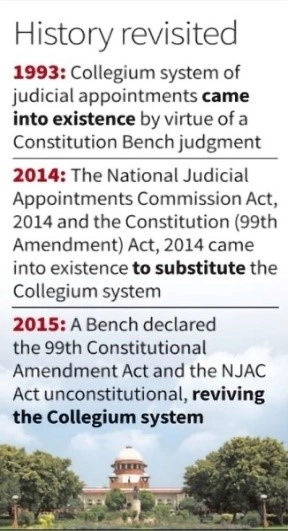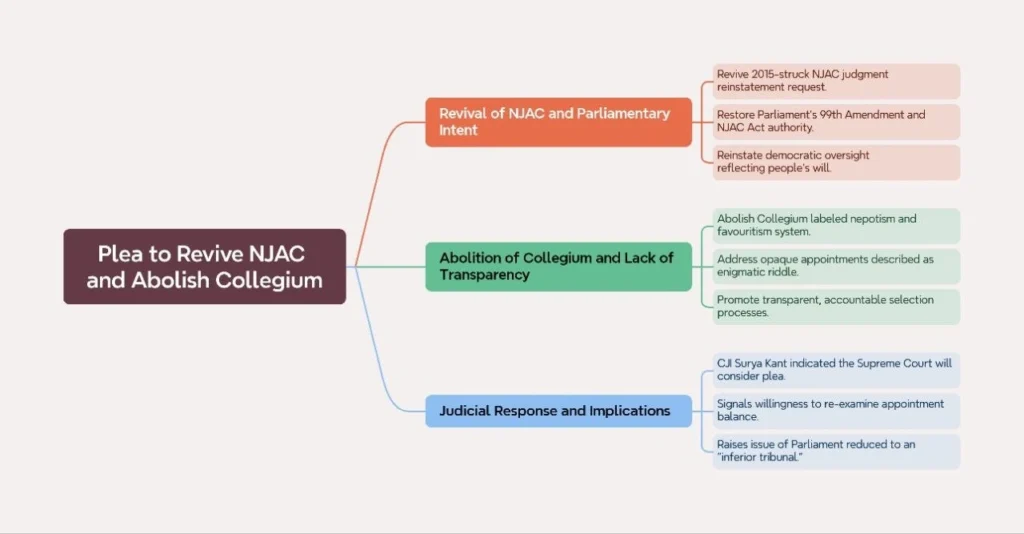Paper: GS – II, Subject: Polity, Topic: Judiciary, Issue: National Judicial Appointments Commission (NJAC).
Context:
A recent development in the Indian judicial system where the Supreme Court has indicated its willingness to consider a plea seeking to revive the National Judicial Appointments Commission (NJAC) and abolish the existing Collegium system for judicial appointments.
Key Takeaways:
The NJAC, which was previously struck down as unconstitutional, aimed to give the government a role in the appointment of judges.

Background: Collegium System:
- Origin: The Collegium system came into existence in 1993 through a Constitution Bench judgment.
- Function: It is a system where appointments and transfers of judges in the higher judiciary are decided by a group of senior judges.
- Criticism: It has been criticized for its lack of transparency, potential for nepotism, and exclusion of government input.
National Judicial Appointments Commission (NJAC):
- Enactment: The National Judicial Appointments Commission Act, 2014, and the Constitution (99th Amendment) Act, 2014, were enacted to replace the Collegium system.
- Purpose: The NJAC aimed to provide a more balanced approach by including representatives from the judiciary, government, and civil society in the appointment process.
Composition: The NJAC was to be composed of:
- The Chief Justice of India (Chairperson)
- Two senior-most Supreme Court judges
- The Union Minister of Law and Justice
- Two eminent persons nominated by a committee consisting of the Chief Justice of India, the Prime Minister, and the Leader of the Opposition in the Lok Sabha.
Striking Down of NJAC:
- Decision: In 2015, the Supreme Court declared the 99th Constitutional Amendment Act and the NJAC Act unconstitutional.
- Reasoning: The court held that the NJAC would undermine the independence of the judiciary, which is a basic feature of the Constitution.
- Result: The Collegium system was revived.
Current Plea:
- Advocate Mathews J. Nedumpara
- Role: Advocate Mathews J. Nedumpara has filed a plea seeking to revive the NJAC and end the Collegium system.
- Argument: He argues that striking down the NJAC was a “great wrong” because it substituted the will of the people with the opinion of a few judges.
Plea to Revive NJAC and Abolish Collegium:

The Supreme Court’s willingness to consider the plea to revive the NJAC marks a significant development in the ongoing debate over judicial appointments in India. The arguments for and against the Collegium system highlight the complex balance between judicial independence, transparency, and government involvement.
La Excellence IAS Academy, the best IAS coaching in Hyderabad, known for delivering quality content and conceptual clarity for UPSC 2025 preparation.
FOLLOW US ON:
◉ YouTube : https://www.youtube.com/@CivilsPrepTeam
◉ Facebook: https://www.facebook.com/LaExcellenceIAS
◉ Instagram: https://www.instagram.com/laexcellenceiasacademy/
GET IN TOUCH:
Contact us at info@laex.in, https://laex.in/contact-us/
or Call us @ +91 9052 29 2929, +91 9052 99 2929, +91 9154 24 2140
OUR BRANCHES:
Head Office: H No: 1-10-225A, Beside AEVA Fertility Center, Ashok Nagar Extension, VV Giri Nagar, Ashok Nagar, Hyderabad, 500020
Madhapur: Flat no: 301, survey no 58-60, Guttala begumpet Madhapur metro pillar: 1524, Rangareddy Hyderabad, Telangana 500081
Bangalore: Plot No: 99, 2nd floor, 80 Feet Road, Beside Poorvika Mobiles, Chandra Layout, Attiguppe, Near Vijaya Nagara, Bengaluru, 560040
